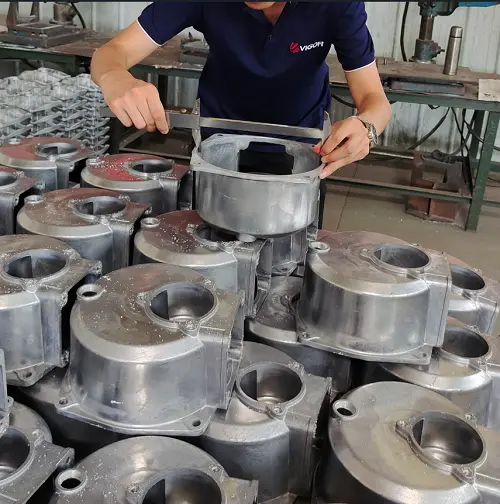
Knowledge
Different Aluminum Alloy for Die-casting and Gravity Casting

The aluminum alloy grades suitable for die casting and their applications are as follows:
A380 aluminum alloy: This alloy has a relatively high silicon content, typically ranging from 5% to 10%, which makes its fluidity far superior to that of pure aluminum, thus demonstrating extremely stable casting performance during the die-casting process. A380 aluminum alloy is not only easy to fill complex molds but also effectively reduces casting defects and is widely used in the manufacturing of automotive parts, electronic device casings, and various mechanical structural components, etc.
ADC12 aluminum alloy: Similar to A380, the silicon content of ADC12 is also between 6% and 10%, but its unique composition ratio makes it exhibit superior fluidity and thermal crack resistance during the die-casting process. This alloy is particularly suitable for manufacturing parts such as cylinder head covers, sensor brackets, and cylinder blocks, which require both structural strength and good appearance.
A383 aluminum alloy: This alloy has certain similarities in composition to A380, but a slight adjustment in its silicon content makes it superior in casting performance, especially when manufacturing die-cast parts that need to bear certain loads. A383 can offer higher strength and better durability, and is widely used in complex structural components in fields such as automobiles and motorcycles.
A413 aluminum alloy: Renowned for its outstanding fluidity and fillability, A413 aluminum alloy excels in the production of thin-walled and complex-shaped die-cast parts. This characteristic makes it an ideal choice for manufacturing precision electronic components, small mechanical parts, and other fields.
6061 Aluminum Alloy:
Die-casting Difficulty: Although 6061 aluminum alloy has good formability, weldability and machinability, its silicon (Si) content is 4 to 8, which makes the die-casting process relatively difficult. During the die-casting process, 6061 aluminum alloy is prone to defects such as porosity, cold shuts and gas holes.
Solution: To reduce the die-casting difficulty of 6061 aluminum alloy, it is necessary to strictly control die-casting parameters such as temperature, pressure and speed to ensure the quality and stability of the product. At the same time, advanced die-casting technologies and equipment, such as vacuum die-casting and oxygen-charging die-casting, can also effectively reduce die-casting defects.
6061 aluminum alloy is widely used in the manufacture of parts and structural components with certain strength requirements, such as bicycle frames and aircraft components.
7075 Aluminum Alloy:
Die-casting Difficulty: 7075 aluminum alloy is a high-strength and high-hardness aluminum alloy with excellent wear resistance and corrosion resistance. However, due to its high content of alloying elements, it is prone to problems such as coarse microstructure and uneven composition during solidification, making it difficult for traditional die-casting processes to directly produce well-formed castings.
Solution: To address the die-casting difficulty of 7075 aluminum alloy, semi-solid forming techniques, such as rheo-die-casting, can be adopted. Rheo-die-casting controls the solidification process of the aluminum alloy to obtain castings with fine and round microstructures, significantly improving the microstructure and casting defects of the formed parts. Additionally, using advanced die-casting equipment and optimizing process parameters can also enhance the die-casting quality and efficiency of 7075 aluminum alloy.
Although 7075 aluminum alloy has high requirements for the die-casting process, its outstanding mechanical properties make it an ideal material for manufacturing parts and structural components that need to withstand high loads and complex stresses, commonly found in aerospace, high-end sports equipment, and other fields.
The aluminum alloy grades suitable for gravity casting and their applications mainly include the following types:
ADC12 aluminum alloy:
Characteristics: It has excellent casting performance and fluidity, making it suitable for manufacturing complex-shaped die-cast parts. It also has good corrosion resistance.
Applications: It is widely used in rapid casting and precision casting to manufacture various mechanical parts, automotive components, etc.
ADC10 aluminum alloy:
Characteristics: It has higher tensile strength and hardness than ADC12, but its fluidity is slightly poorer. It is suitable for parts with higher loads.
Applications: It is used for components that require higher strength, such as mechanical parts and automotive structural parts.
A380 aluminum alloy:
Characteristics: It has excellent mechanical properties and corrosion resistance, and is one of the most commonly used aluminum alloys in the die-casting industry.
Applications: It is widely used in automotive engine blocks, transmission cases, electronic product casings, etc.
A356.2 aluminum alloy:
Characteristics: Good fluidity, high casting precision, excellent mechanical properties and impact resistance.
Applications: Used in automotive parts, aerospace equipment and marine devices.
Aluminum-zinc alloys (such as ZL101, ZL102):
Characteristics: Simple composition, easy to smelt and cast, good casting performance, good air tightness, and relatively good welding and cutting processing performance, but with relatively low mechanical properties.
Applications: Suitable for casting thin-walled, large-area, and complex-shaped parts with low strength requirements, such as pump casings, gearboxes, instrument shells (frames), and parts for household appliances.
When selecting materials, choices should be made based on specific application fields and requirements to achieve better results. For instance, for products that need high strength and corrosion resistance, A380 or ADC10 are good options; if excellent fluidity and ease of processing are required, ADC12 or A356.2 would be more suitable.
Vigor has more than 18 years experience on metal hot working processes. If you have any question and demand of products development or improve your supply chain, please feel free to contact us at info@castings-forging.com



